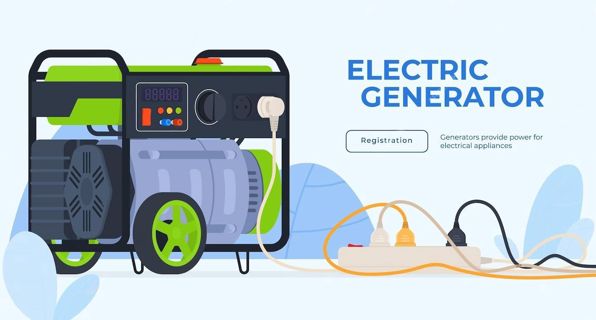The Ultimate Guide to Find and Fix Your Generator Problems: Expert Tips and Solutions

Generators are essential for maintaining power during outages, supporting businesses, and ensuring that critical systems remain operational. However, like any mechanical or electrical device, generators can encounter problems.
In this comprehensive guide, we'll explore common generator issues, provide troubleshooting tips, and offer expert advice on how to find and fix these problems effectively.
Understanding Common Generator Issues
Generators can experience a variety of issues due to mechanical failure, electrical faults, or fuel system problems. Here are some common problems you might encounter:
Generator Won’t Start: This is a frequent issue that could be due to problems with the battery, fuel system, or starter motor. If the generator doesn’t start, the first step is to check if the battery is charged and properly connected.
Generator Runs Rough or Stalls: A generator that runs roughly or stalls could be suffering from fuel delivery issues, air filter problems, or spark plug malfunctions. Poor fuel quality or a clogged air filter can affect engine performance.
Low Power Output: If your generator is not supplying enough power, it might be due to overloading, improper maintenance, or internal component failure. Checking the load capacity and maintenance records can help diagnose this issue.
Overheating: Overheating can be caused by a variety of factors including low oil levels, blocked air vents, or a malfunctioning cooling system. Regular maintenance and proper ventilation are crucial to preventing overheating.
Excessive Noise: Generators that produce unusual noises may have issues with the engine or exhaust system. Noise can be indicative of loose components or internal damage.
Troubleshooting Your Generator
Before calling a professional, try troubleshooting the problem yourself. Here’s a step-by-step guide to help you:
1. Check the Basics
Fuel Supply: Ensure there is enough fuel in the tank. Check for any leaks or contamination in the fuel system.
Battery Condition: Inspect the battery for charge and corrosion. Clean terminals and ensure connections are secure.
Oil Levels: Verify that the oil level is adequate and that the oil is clean. Low or dirty oil can affect generator performance.
2. Inspect the Air Filter and Spark Plugs
Air Filter: A clogged air filter can restrict airflow, causing the engine to run poorly. Replace or clean the air filter if necessary.
Spark Plugs: Worn or fouled spark plugs can cause starting issues and poor engine performance. Replace spark plugs if they show signs of wear.
3. Examine the Cooling System
Check Coolant Levels: Ensure that the coolant levels are sufficient and that there are no leaks in the cooling system.
Clean Vents: Make sure that air vents and cooling fins are free from dust and debris to prevent overheating.
4. Look for Error Codes
Many modern generators come with diagnostic systems that can display error codes. Refer to your generator’s manual to interpret these codes and understand what might be wrong.
5. Test Electrical Components
Circuit Breakers: Check if any circuit breakers have tripped. Reset them if necessary, and investigate the cause of the trip.
Wiring and Connections: Inspect all wiring and electrical connections for signs of damage or loose connections.
Finding a Professional Generator Repair Service
If troubleshooting doesn’t resolve the issue, it may be time to seek professional help. Here’s how to find a reputable generator repair service:
1. Research Local Providers
Look for generator repair services in your area. Check online reviews, ratings, and ask for recommendations from friends or family. A provider with a good reputation is more likely to offer reliable service.
2. Verify Qualifications
Ensure that the repair technician is certified and has experience working with your specific type and model of generator. Proper qualifications indicate that the technician is knowledgeable and skilled.
3. Request a Detailed Estimate
Before agreeing to any repairs, request a detailed estimate outlining the cost of parts and labor. This helps avoid unexpected charges and ensures transparency.
4. Inquire About Warranties
Ask if the repair service offers any warranties on their work or the parts used. A warranty provides peace of mind and ensures that any issues arising after the repair will be addressed.
Preventive Maintenance Tips
Regular maintenance is key to preventing generator problems and extending the lifespan of your equipment. Here are some preventive maintenance tips:
1. Regular Oil Changes
Change the oil according to the manufacturer’s recommendations. Clean oil helps lubricate engine components and prevent wear.
2. Replace Filters
Regularly replace air filters, fuel filters, and oil filters to ensure optimal performance and efficiency.
3. Test the Generator
Perform regular load tests to ensure that the generator is capable of handling the load. This helps identify potential issues before they become serious problems.
4. Keep it Clean
Clean the generator and its surrounding area to prevent dust and debris from causing blockages or damage.
5. Check Battery Health
Inspect the battery regularly for charge and corrosion. Replace it if it shows signs of deterioration.
Conclusion
Generators are a vital component for maintaining power during outages and supporting critical systems. Understanding common issues and knowing how to troubleshoot and repair problems can save you time and money.
Follow Abeer Khanzadi to stay updated on their latest posts!
0 comments
Be the first to comment!
This post is waiting for your feedback.
Share your thoughts and join the conversation.
